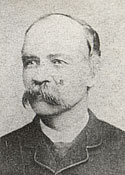29 Aug. 1837–27 Feb. 1916

In 1868 McMillan was licensed and began to practice law in Wadesboro. He soon returned to Red Springs, however, and resumed teaching as well as practicing law. Here he became interested in the historical background of the Indians of Robeson County. His inclination towards research led him to undertake an investigation of their past, and he came to believe that they were descendants of Sir Walter Raleigh's "Lost Colony" of 1587. In 1885, the three hundredth anniversary year of the departure of the Ralph Lane colony from Roanoke Island, McMillan published a pamphlet on the Lost Colony that presented his personal conclusions linking the Croatan Indians and the English colonies to the Robeson County Indians. His conclusion was based on what he considered to be evidence of old English pronunciations used by these Indians and the occurrence of some family names of Roanoke colonists among them. In 1888 and 1907 he repeated his theory in editions of Sir Walter Raleigh's Lost Colony. Continuing his crusade, he wrote The Lost Colony Found, which was printed about 1898. In 1911 The North Carolina Booklet (vol. 10) published his article, "The Croatans."
In 1885 the voters of Robeson County sent McMillan to the General Assembly, where he was responsible for enacting legislation to officially recognize these people as "Croatan Indians" and to establish a separate school system under their control. Returning to the house in 1887, he supported the passage of another act that established the Indian Normal School in Pembroke. His efforts on behalf of the Indians in his county greatly improved their lot and brought them increased respect—not only among themselves but from others as well.
McMillan married Elizabeth Gillespie Robeson of Bladen County on 17 Feb. 1863. They became the parents of seven children: Mary Eliza, Janie Robeson (Mrs. B. W. Townsend), John Robeson, Cornelia Spencer, David Gillespie, William Graham, and one who died as an infant. William Graham died soon after his graduation from the U.S. Naval Academy. McMillan died in Red Springs.